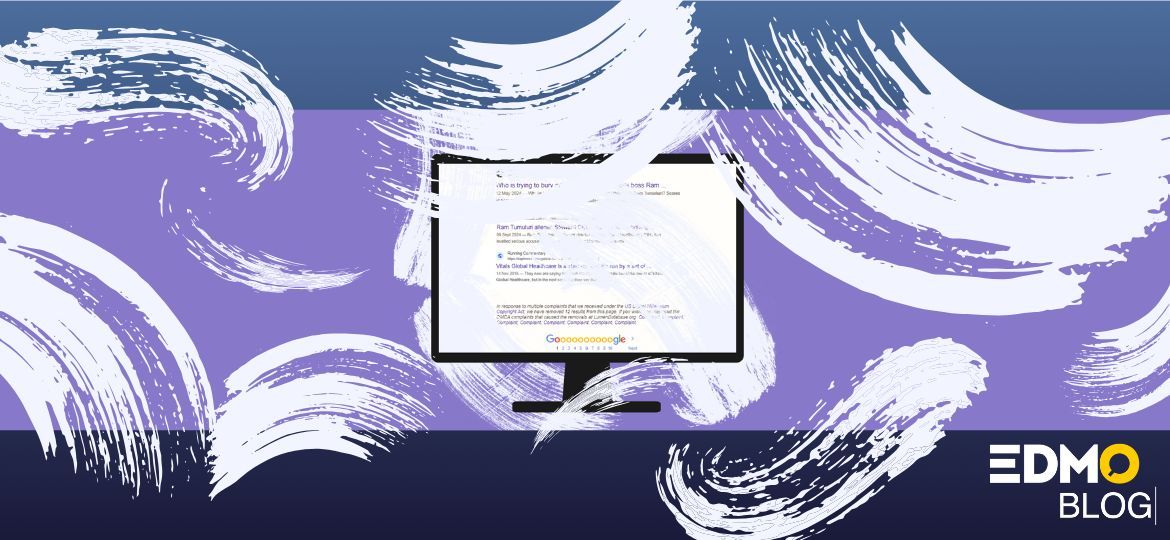Whitewashing the web: How copyright complaints made to Google can be abused by bad actors
The views expressed in this publication are those of the author and do not necessarily reflect the official stance of the European Digital Media Observatory.
23.01.2025
Author: Megan Mallia, Department of Media & Communications, University of Malta / MedDMO
Abstract of article:
A recent report published by the Mediterranean Digital Media Observatory highlights a growing digital disinformation tactic targeting Maltese media: bogus copyright complaints submitted to Google to get articles about a major corruption scandal removed from search results. This tactic is used by bad actors globally to whitewash the web.
Keywords: disinformation, media censorship, Google search, journalism, big tech
Disinformation comes in many forms. A lot these most will know: text message scams, sensational claims on social media, harmful propaganda spread by politicians, AI-generated images, deepfake videos.
But there are less obvious forms. Bogus copyright complaints made to Google, for instance, which bad actors are using to get legitimate information removed from search results, effectively whitewashing the web.
One of our latest investigations at MedDMO, the Mediterranean Digital Media Observatory, looks into a recent and seemingly coordinated barrage of bogus copyright claims submitted to Google that targeted Maltese journalists and newsrooms writing about a major corruption scandal.
For context, the said scandal involved a deal to privatise three of Malta’s state hospitals, which was first reported on in 2015 by journalist Daphne Caruana Galizia. The deal was declared fraudulent from the start, and in April 2024, a magisterial inquiry led to criminal charges against high-profile figures, including Malta’s former prime minister Joseph Muscat, his then-chief of staff Keith Schembri, and a minister of his then-cabinet Konrad Mizzi. Dozens of other individuals and companies were set to face charges, including one Ram Tumuluri, the former boss of Vitals Global Healthcare, the firm that had won the concession.
Back to the bogus copyright complaints. In May 2024, Times of Malta reported that scores of such complaints targeting Maltese websites had been made to Google since March 2024, which was just weeks before the magisterial inquiry concluded.
Something didn’t feel right even before the Times published. When doing research for a separate MedDMO report on disinformation surrounding the hospitals deal, my searches on specific keywords were returning a note from Google that some results had been removed due to claims of plagiarism. Then the Times published their article, and it was clear something was very wrong.
The complaints targeted sites containing articles about the former boss of Vitals Global Healthcare. Each and every one of the complaints claimed the same thing: that legitimate media had plagiarised articles supposedly written by the person/people making the complaints. Needless to say, this was not true.
Fake copyright complaints are a tactic used by bad actors internationally to get key information removed from Google’s search results. As we write in our report, OCCRP – the Organized Crime and Corruption Reporting Project – has described the strategy as a ‘mercenary industry’. OCCRP itself was hit with a bogus copyright complaint in 2020.
In Malta’s case, there seemed to be a pattern to the claims. So, in September 2024, we dug a little deeper. We conducted advanced searches on Google, pairing the URLs of various Maltese news sites and blogs with the keywords ‘ram tumuluri’ and ‘vitals global healthcare’. Each time, the same message appeared at the bottom of the search results:
In response to multiple complaints that we received under the US Digital Millennium Copyright Act, we have removed [number] results from this page. If you wish, you may read the DMCA complaints that caused the removals at LumenDatabase.org: [hyperlinks to records of each complaint].
Our research revealed that some content was hit with several complaints. One blog post, for example, was the subject of at least five submissions, each filed under a different name/pseudonym and in close succession – and each claiming, illogically, that the post plagiarised a different article.
Our report, published on MedDMO’s website on 8th January 2025, explains this sinister disinformation tactic and how we went about our investigation in much more detail.
What becomes obvious as you learn more about these fake complaints is that disinformation is not always as obvious as we may like to believe.
We are living in a time when disinformation is slowly becoming synonymous with malicious AI usage, but it goes beyond that. Bogus copyright complaints are being used to censor and discredit journalistic work right beneath our noses, and most of the time, we’re not even aware of it.
As politics and business grow more intertwined, we are questioning the power big tech companies like Meta and X have over our access to information. Perhaps we need to think more about search engines – not just in terms of algorithms, but also in the power allowed to disinformation actors seeking the removal of specific content. It’s something we need to keep an eye on.
